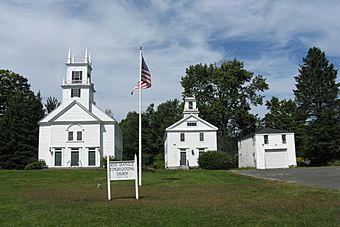West Granville Historic District facts for kids
Quick facts for kids |
|
|
West Granville Historic District
|
|

Congregational Church
|
|
| Location | Roughly, Main Rd. from west of Beach Hill Rd. to South Ln. No. 2, Granville, Massachusetts |
|---|---|
| Architectural style | Greek Revival, Georgian, Federal |
| NRHP reference No. | 91001589 |
| Added to NRHP | November 5, 1991 |
The West Granville Historic District is a special area in West Granville, Massachusetts. It's like a time capsule, filled with buildings from the late 1700s and early 1800s. You can see an old church from the 1700s and a school building from the 1830s. This historic district was added to the National Register of Historic Places in 1991.
Contents
Exploring West Granville's Past
Granville was first settled in 1734. Most of the early town activities happened in a different area called Granville Center. West Granville grew up later in a quiet valley. It was mostly a farming area.
How the Village Began
The village started to form around a crossroads. A very important building, the Second Congregational Church, was built here in 1778. This church helped the village grow.
Growth and Change Over Time
West Granville continued to do well in the early 1800s. But then, things started to change. Other parts of Granville, especially Granville Village, became more important. This was because of new industries growing there.
Also, the town of Tolland, which was just west of West Granville, became its own separate town. Because of these changes, West Granville kept its old-fashioned look. It still feels like a village from the 1800s.
What You Can See in the District
The West Granville Historic District mainly stretches along Main Road. This road is also known as Massachusetts Route 57. The district goes from Crest Lane in the east to a four-way intersection in the west. This intersection includes Beech Hill Road and Hartland Hollow Road.
Important Buildings to Discover
The district also goes a short way north on Beech Hill Road. Most of the buildings you'll see are homes. But there are also some important public buildings in the center.
- The Congregational Church, built in 1778.
- An old district schoolhouse.
- A larger academy building, built in 1830. This was a type of school.
Architectural Styles of Homes
The houses in the district were built from the mid-1700s to the late 1800s. They show off different old building styles. You can see homes built in the Greek Revival, Georgian, and Federal architecture styles. Each style has its own unique look.



